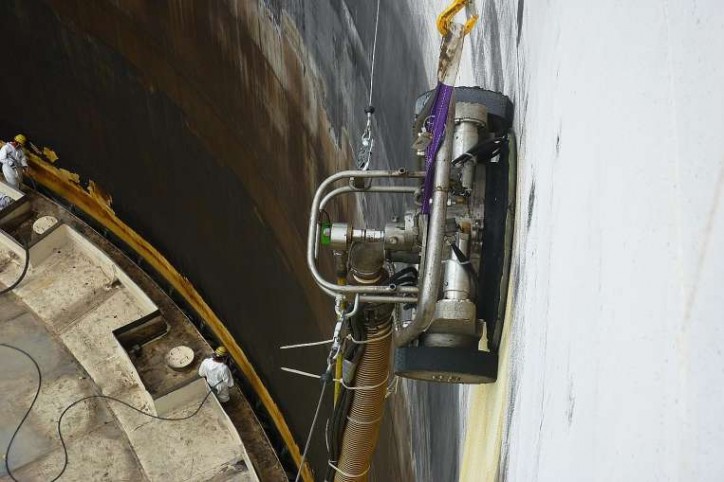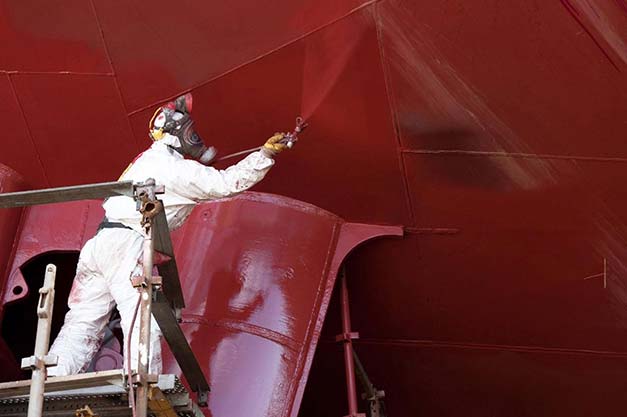A small device used by a local ship maintenance and repair firm has revolutionised the awkward job of repainting large ships. The unassuming device has the ability to climb its way up and down ships 10 to 15 storeys high while scraping off paint or repainting.
It has saved Mencast Holdings both manpower and expenses, its chief executive Glenndle Sim said in a media briefing. Previously, the company had to erect “massive scaffolding”, deploy labour to scrape and repaint, and then dismantle the scaffolding. The hulls of tankers need to be repainted every two to three years.
The Spider Jet Robotic Cleaning device, used by local ship maintenance and repair firm Mencast Holdings, slashes ship repainting time from two months to two weeks. Plus, just three to four workers are needed when the machine is used, against 20 to 30 before. And there is no need to put up and take down huge amounts of scaffolding.

Image: Mencast Holdings
However, with this device, the time required to scrape paint off ships and repaint them has been cut down to about two weeks from two months. Only three to four workers are needed when the machine is used, against 20 to 30 before.
“This business is scalable because it can add (a further) two to three robots to speed up the job. So it’s a win-win whereby we have higher productivity, cost savings, it’s safe, and our clients are very happy because we can turn around real quick,” said Mr Sim, who declined to quantify cost savings.
The entire system costs $2 million and the company bought it from Japan late last year.
Mr Sim was speaking at the press briefing for the Singapore Productivity Awards 2015, an initiative of the Singapore Business Federation (SBF). The initiative recognises local enterprises that have demonstrated excellence in productivity.
 The initiative picked out eight local enterprises from six sectors. The eight winners were Jumbo Group, Singapore Marriott Tang Plaza Hotel, M1, CWT, Poh Tiong Choon, Mencast Holdings, YHS (Singapore), and Charles & Keith (Singapore).
The initiative picked out eight local enterprises from six sectors. The eight winners were Jumbo Group, Singapore Marriott Tang Plaza Hotel, M1, CWT, Poh Tiong Choon, Mencast Holdings, YHS (Singapore), and Charles & Keith (Singapore).
At the briefing, the winners spoke of ways they improved productivity.
CWT, a logistics and supply chain solutions provider, developed a depot at which logistics firms pool trailers used to move containers. A company is able to use another firm’s lorry and trailer to transport its goods if doing so is more efficient.
For instance, if a company has to take a container to the port, but does not have any container to bring back, another company which needs to have a container shipped back from the port can use the former company’s trailer to do so. As a result, the first company’s trailer is better utilised on the trip back, and the other company does not need to send an empty trailer to the port just to collect its goods.
Marriott also spoke about how it has installed a self-service wine dispenser in its cafe. Guests can purchase a card from a hotel staff and obtain 16 different types of wine from the machine.
“Before, we would offer a wine buffet and it meant our staff would have to clean it up or change the bottles or replenish the ice. Because this machine is designed to keep the wine in optimal condition, less manpower is needed to maintain it.”
Marriott also related how it implemented a mobile check-in app to reduce check-in time. With the app, customers are able to check in through their smartphones before arriving at the hotel.
At the awards’ gala dinner, Minister for Trade and Industry (Trade) Lim Hng Kiang said firms could increase productivity through innovations and encouraging collaborations within their organisations and with other organisations.
Source: www.straitstimes.com